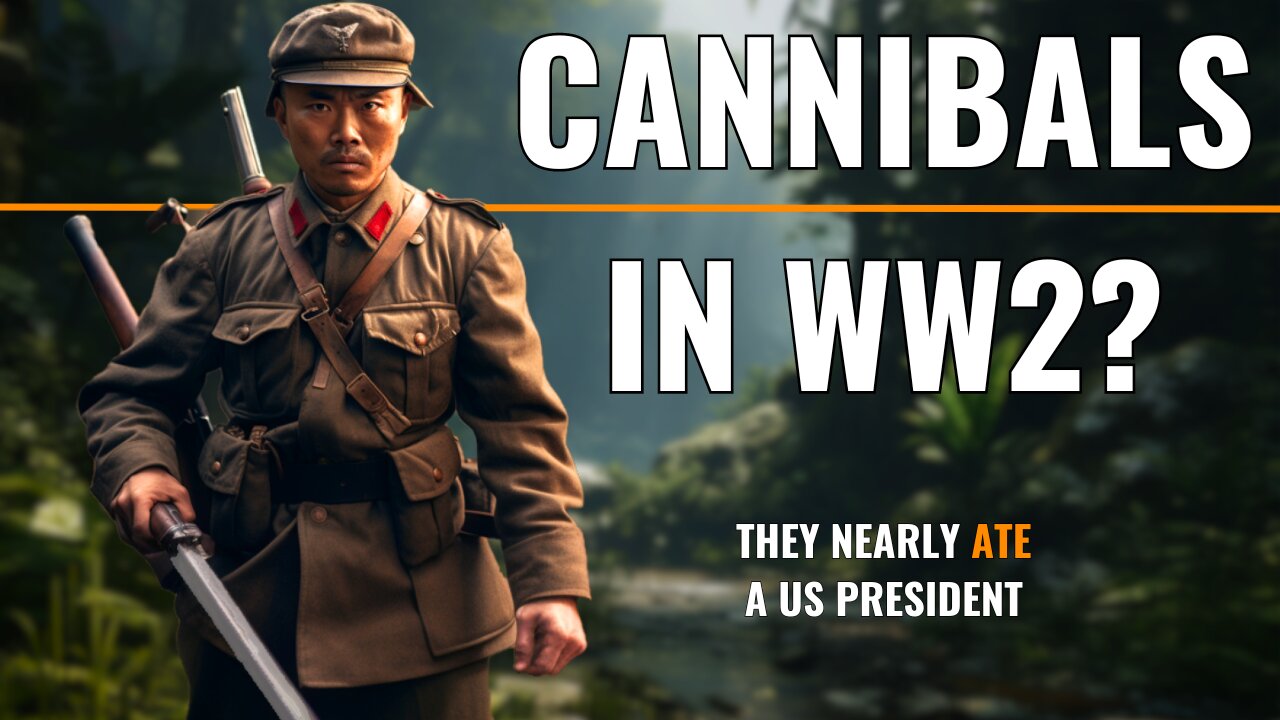Premium Only Content

Unknown Horrors of the Imperial Japanese Army During WW2
(An edited version for all audiences)
Ever heard of soldiers munching on other soldiers? Yeah, that happened.
________
To truly grasp the intensity of these horrors, we must first understand the ethos that drove many Japanese soldiers: Bushidō, a Japanese equivalent of a knight’s chivalric code.
It was as intense as it sounds. But it was also about a lot more than just swinging a katana and wearing armor.
Originating in the Edo period, which spanned from 1603 to 1868, Bushidō was a way of life, deeply ingrained in the samurai culture.
And while it might be tempting to draw parallels with European chivalry, let's not get too hasty. Sure, there were similarities, like a focus on honor and loyalty… to a degree.
But Bushidō had its own unique flavor, a blend of Confucianism, Shinto, and Zen Buddhism, giving it a depth and complexity that was distinctly Japanese, emphasizing values like sincerity, frugality, and loyalty above all else.
Loyalty especially, was paramount, even if not all samurai adhered to this principle… let alone all IJA members.
The pursuit of excellence in martial arts? That was expected of course. But it wasn't just about physical prowess. It was about the mind, strategy, discipline, and honor.
Honor until death. In fact, the concept of "seppuku" or ritual suicide was a testament to this. If a samurai felt they had lost their honor, they'd rather end their life than live in disgrace, ritualistically stabbing themselves in the stomach with the aim of disembowelment.
Ever heard of soldiers munching on other soldiers? Yeah, that happened.
________
To truly grasp the intensity of these horrors, we must first understand the ethos that drove many Japanese soldiers: Bushidō, a Japanese equivalent of a knight’s chivalric code.
It was as intense as it sounds. But it was also about a lot more than just swinging a katana and wearing armor.
Originating in the Edo period, which spanned from 1603 to 1868, Bushidō was a way of life, deeply ingrained in the samurai culture.
And while it might be tempting to draw parallels with European chivalry, let's not get too hasty. Sure, there were similarities, like a focus on honor and loyalty… to a degree.
But Bushidō had its own unique flavor, a blend of Confucianism, Shinto, and Zen Buddhism, giving it a depth and complexity that was distinctly Japanese, emphasizing values like sincerity, frugality, and loyalty above all else.
Loyalty especially, was paramount, even if not all samurai adhered to this principle… let alone all IJA members.
The pursuit of excellence in martial arts? That was expected of course. But it wasn't just about physical prowess. It was about the mind, strategy, discipline, and honor.
Honor until death. In fact, the concept of "seppuku" or ritual suicide was a testament to this. If a samurai felt they had lost their honor, they'd rather end their life than live in disgrace, ritualistically stabbing themselves in the stomach with the aim of disembowelment.
Ever heard of soldiers munching on other soldiers? Yeah, that happened.
________
To truly grasp the intensity of these horrors, we must first understand the ethos that drove many Japanese soldiers: Bushidō, a Japanese equivalent of a knight’s chivalric code.
It was as intense as it sounds. But it was also about a lot more than just swinging a katana and wearing armor.
Originating in the Edo period, which spanned from 1603 to 1868, Bushidō was a way of life, deeply ingrained in the samurai culture.
And while it might be tempting to draw parallels with European chivalry, let's not get too hasty. Sure, there were similarities, like a focus on honor and loyalty… to a degree.
But Bushidō had its own unique flavor, a blend of Confucianism, Shinto, and Zen Buddhism, giving it a depth and complexity that was distinctly Japanese, emphasizing values like sincerity, frugality, and loyalty above all else.
Loyalty especially, was paramount, even if not all samurai adhered to this principle… let alone all IJA members.
The pursuit of excellence in martial arts? That was expected of course. But it wasn't just about physical prowess. It was about the mind, strategy, discipline, and honor.
Honor until death. In fact, the concept of "seppuku" or ritual suicide was a testament to this. If a samurai felt they had lost their honor, they'd rather end their life than live in disgrace, ritualistically stabbing themselves in the stomach with the aim of disembowelment.
-
 LIVE
LIVE
The Quartering
41 minutes agoRFK Impeachment, Erika Kirk TORCHES Candace, More Epstein Files Unsealed, Ilhan Omar Deported?
11,057 watching -
 1:12:19
1:12:19
DeVory Darkins
1 hour agoTrump GOES OFF in brutal rant during rally leaves Democrats stunned
100K51 -
 LIVE
LIVE
Dr Disrespect
3 hours ago🔴LIVE - DR DISRESPECT - TARKOV 1.0 - DEAL OR NO DEAL
1,498 watching -
 LIVE
LIVE
Putther
1 hour ago🔴GTA ONLINE MANSION DLC IS OUT!!! SPENDING MILLIONS!!
105 watching -
 1:08:50
1:08:50
Sean Unpaved
1 hour agoAre CJ Stroud & Texans About To Make A SUPER BOWL RUN? | UNPAVED
8311 -
 UPCOMING
UPCOMING
Committee on House Administration
1 day agoSubcommittee on Elections Hearing: “Examining Potential Updates to the NVRA”
6 -
 1:04:49
1:04:49
Timcast
2 hours agoTrump Goes NUCLEAR At Rally, Demands Ilhan Omar Be DEPORTED
154K32 -
 14:22
14:22
Silver Dragons
1 hour agoBullion Dealer Reacting to $60 Silver Price (Insane)
-
 1:51:30
1:51:30
Steven Crowder
5 hours agoTrump Unloads on Europe...and Who Can Really Be American?
336K252 -
 1:01:15
1:01:15
The Rubin Report
3 hours agoIlhan Omar Just Got Scared After Trump’s Brutal Threat to Her
44.1K66